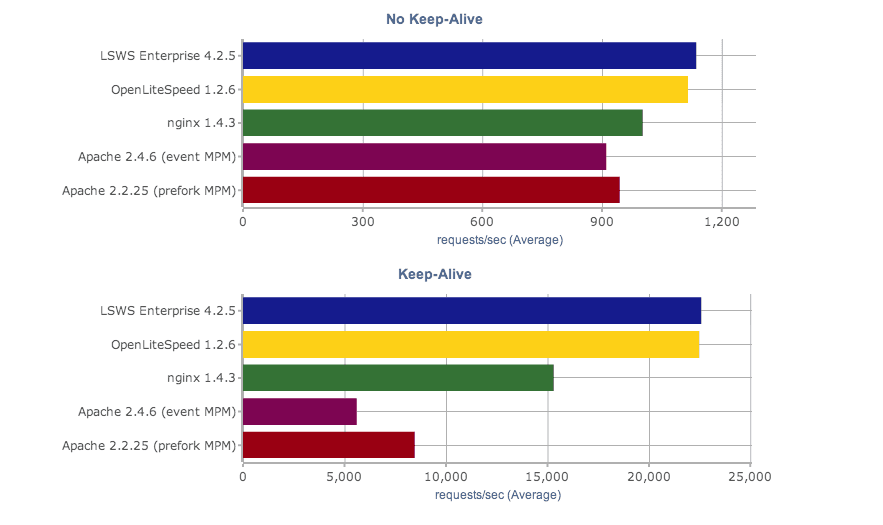New Benchmarks! LiteSpeed vs. Apache vs. nginx for Static Content
Our new static content benchmarks pit both versions of LiteSpeed Web Server against nginx and Apache, with LiteSpeed once again dusting the competition.
It’s the event everyone’s been waiting for: LiteSpeed Enterprise 4.2.5 vs. OpenLiteSpeed 1.2.6 vs. nginx 1.4.3 vs. Apache 2.4 vs. Apache 2.2. We tested these five web servers’ abilities to handle massive traffic requesting small static files (100 bytes) over both HTTP and HTTPS connections. The winner? LiteSpeed Enterprise.
Full results for HTTP and HTTPS.
Highlights
LSWS Enterprise showed the greatest gains with keep-alive connections enabled:
HTTP
- 245% faster than Apache 2.2 with pre-fork MPM
- 533% faster than Apache 2.4
- 67% faster than nginx
HTTPS
- 167% faster than Apache 2.2
- 302% faster than Apache 2.4
- 47% faster than nginx
LiteSpeed Enterprise also tested a little faster than OpenLiteSpeed in all tests, though OpenLiteSpeed still bested all other competitors.
Discussion
We believe the test shows two things:
- A stark difference between event-driven and process-based web servers: Both LiteSpeed and nginx severely out-performed Apache, even with event MPM.
- Not all event-driven web servers are made the same: nginx just does not have the speed of LiteSpeed’s highly optimized code.
In the test we tried to remove as many other variables as we could, using the same hardware and purposely keeping the file size tiny. The goal was to demonstrate pure speed differences when serving your static content. This is, of course, just one facet of web service and, in future tests, we will examine other situations and types of content, including bigger files and dynamic pages.
Reactions, Please
This is the first in a series of tests that will examine performance with many kinds of content. We hope this test will spark conversation. Let us know your reactions on our forum. You can find the test configurations and hardware specs with the benchmark results. We’d be happy to hear any objections you have or feedback on the configurations. We encourage you to reproduce the test yourself or suggest any changes you would like to see.


Comments